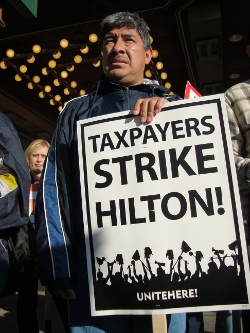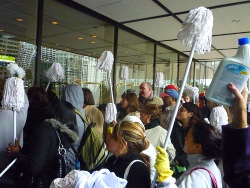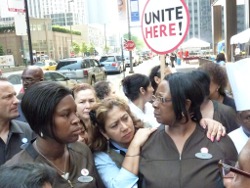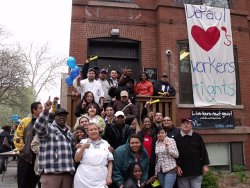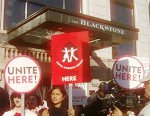Nearing holidays and facing cuts, hotel workers say Hilton is taking unfair advantage of the recession
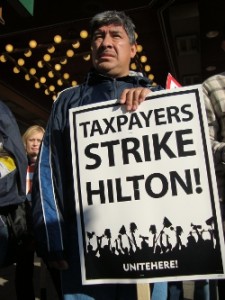 (Chicago, IL) – Just days before the holidays, hotel workers at the Palmer House Hilton are walking off the job, launching a day long strike to protest Hilton’s efforts to lock workers into the recession. Holding signs that read “Taxpayers on Strike,” workers say that Hilton is taking unfair advantage of the recession by squeezing workers even though they wheedled a $180 million bailout from the federal government. Other actions are planned today at the world’s largest Hiltons in Honolulu and San Francisco.
(Chicago, IL) – Just days before the holidays, hotel workers at the Palmer House Hilton are walking off the job, launching a day long strike to protest Hilton’s efforts to lock workers into the recession. Holding signs that read “Taxpayers on Strike,” workers say that Hilton is taking unfair advantage of the recession by squeezing workers even though they wheedled a $180 million bailout from the federal government. Other actions are planned today at the world’s largest Hiltons in Honolulu and San Francisco.
Hilton Worldwide, which manages the Palmer House, is owned by one of Wall Street’s largest private equity firms–Blackstone. Hilton got $180 million of bailout funds not meant for wealthy hotel owners when the Federal Reserve wrote off some debt Hilton owed U.S. taxpayers. Meanwhile, Hilton wants to lock workers into cheap recession contracts even as hotels rebound.
Hilton is on the forefront in the hotel industry in Chicago this contract cycle of pushing a program that would dramatically increase the room quota for housekeepers, lowering the standard of cleanliness for guests, speeding up work, and eliminating jobs. Given the physical nature of the work, such a speed up could result in more injuries for housekeepers who already face difficult and sometimes dangerous working conditions.
CBS2 News Report
“Hilton got $180 million of our tax dollars to protect our jobs, but they keep squeezing us,” says Laticia Wilson, a room attendant at the Palmer House Hilton. “I put my hip out just last week while cleaning the rooms, and now they want to add more rooms to what we already have to clean in a day. If Hilton gets their way, more ladies are going to be hurt or laid off.”
The striking workers are members of UNITE HERE Local 1, and include housekeepers, dishwashers, cooks, bell staff, food servers, and others. Hilton workers are among 8,000 other hotel workers in the Chicago area whose contracts expired on August 31, 2009. In August 2010, Hilton workers in Chicago voted overwhelmingly to authorize a strike at 4 area properties – the Palmer House Hilton, Hilton O’Hare, the Chicago Hilton, and the Drake, with 96% of union members voting in favor of a strike. The Chicago Hilton and Hilton O’Hare are owned by Hilton and all four are Hilton-managed. UNITE HERE Local 1 represents over 500 workers at the Palmer House, a 1639-room hotel in downtown Chicago.
“An issue of deep concern to Chicago, which has faced a loss of convention business in the last year, is Hilton’s introduction of a dramatic increase to the housekeeping workload—what we call the “Dirty Rooms” program,” says UNITE HERE Local 1 President Henry Tamarin. “Despite having benefited from millions in taxpayer dollars, Hilton’s proposals threaten to lower the standard for cleanliness and guest service at one of the city’s premiere convention hotel properties.”
Blackstone Group [NYSE: BX] manages $100 billion in assets for large pension funds and other investors around the country. Nationwide, the hotel industry is already rebounding faster and stronger than expected. PKF Hospitality projects that hotel revenues will rise an average of 8% annually from 2010 through 2014. Despite trends showing a strong recovery for the hotel industry, hotels are refusing to share that recovery with workers.
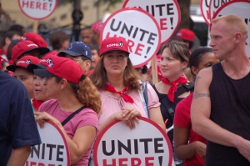 46 Aldermanic races up for grabs. 1 new mayor. It’s a new year, and for the first time in decades, anything is possible in Chicago.
46 Aldermanic races up for grabs. 1 new mayor. It’s a new year, and for the first time in decades, anything is possible in Chicago.
